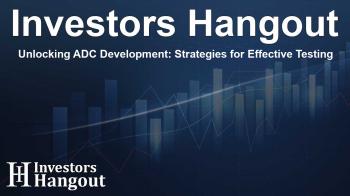Unlocking ADC Development: Strategies for Effective Testing

Revolutionizing ADC Development Through Early Testing
In an effort to enhance the development of antibody-drug conjugates (ADCs), a new approach emphasizing a "fail faster" methodology is taking center stage. This strategy is designed to mitigate challenges that often lead to difficulties late in the development process. A key focus of this discussion is the importance of early in vitro testing, which serves to illuminate both the potential efficacy of ADCs and the risks associated with off-target toxicity.
Insights from Leading ADC Experts
During an upcoming webinar, attendees will hear from respected experts in the field. These industry leaders will shed light on how utilizing tumoroid models provides valuable insights into the activity of ADCs. Unlike traditional two-dimensional models, tumoroids offer a more accurate representation of the tumor microenvironment, therefore allowing for more reliable efficacy and safety analyses.
Understanding Tumor-Specific Antibodies
Effective ADCs hinge on the ability of the tumor-specific antibodies to target diseased cells while causing minimal harm to healthy tissue. Each component of the ADC, including the antibody, linker, and cytotoxic payload, plays a critical role in this balance. Expertise in these areas can direct research teams towards creating better-targeted therapies that maximize effectiveness while minimizing adverse side effects.
Challenges in ADC Development and Solutions
Despite their promise, ADCs are not without complications. High initial investment costs and varying rates of clinical success make ADC development a complex endeavor. Many ADCs falter due to toxicities that curtail their therapeutic window. This underscores the necessity of concentrating resources on the most promising candidates early in the development process. The discussion will explore strategies to efficiently navigate these obstacles.
Innovative Assays for Evaluating ADC Components
Speakers will delve into how specific in vitro assays can rapidly assess ADC components, evaluating both linker stability and payload potency. This evaluation is essential because it enables teams to anticipate and mitigate potential off-target effects. By understanding these dynamics, researchers can better tailor their therapeutic candidates to optimize safety and effectiveness.
Registration Information for the Webinar
Those interested in advancing their understanding of ADC development are encouraged to register for this insightful webinar. Whether you are a newcomer to the field or looking to refine your existing knowledge, this session aims to equip participants with actionable strategies for navigating the complexities of ADC development.
Join distinguished professionals from Discovery Life Sciences, including experts Dr. Emer Clarke and Dr. Shawn Fahl, who will share their wealth of knowledge and insights on this dynamic topic.
About Discovery Life Sciences
As a global frontrunner in biospecimen supply and specialty laboratory services, Discovery Life Sciences empowers scientists in their pursuit of groundbreaking therapeutics and diagnostics. Their comprehensive suite of offerings from human biospecimens to molecular pathology supports researchers at every stage, from initial discovery through to clinical trials.
Frequently Asked Questions
What is the focus of the webinar on ADCs?
The webinar highlights the significance of early testing in ADC development, aiming to minimize off-target toxicity and enhance efficacy.
Who will be presenting at the webinar?
Experts from Discovery Life Sciences, Dr. Emer Clarke and Dr. Shawn Fahl, will lead the session.
How can I register for the ADC webinar?
Registration details are available through Discovery Life Sciences' official communication channels.
What challenges does ADC development face?
ADC development challenges include high costs, clinical success rates, and managing toxicities associated with off-target effects.
What is the importance of tumoroid models in ADC testing?
Tumoroid models provide a more physiologically relevant environment to evaluate ADCs, leading to better predictions regarding their efficacy and safety.
About The Author
Contact Dominic Sanders privately here. Or send an email with ATTN: Dominic Sanders as the subject to contact@investorshangout.com.
About Investors Hangout
Investors Hangout is a leading online stock forum for financial discussion and learning, offering a wide range of free tools and resources. It draws in traders of all levels, who exchange market knowledge, investigate trading tactics, and keep an eye on industry developments in real time. Featuring financial articles, stock message boards, quotes, charts, company profiles, and live news updates. Through cooperative learning and a wealth of informational resources, it helps users from novices creating their first portfolios to experts honing their techniques. Join Investors Hangout today: https://investorshangout.com/
The content of this article is based on factual, publicly available information and does not represent legal, financial, or investment advice. Investors Hangout does not offer financial advice, and the author is not a licensed financial advisor. Consult a qualified advisor before making any financial or investment decisions based on this article. This article should not be considered advice to purchase, sell, or hold any securities or other investments. If any of the material provided here is inaccurate, please contact us for corrections.

